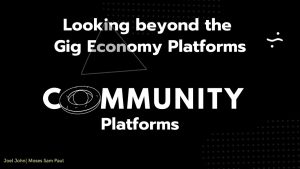Looking beyond the Gig Economy

In our previous blogs we had discussed how the nature of jobs is changing to Gigs and the problems India will face in the near future, if data ownership isn’t considered in designing the future platforms that takes into account all aspects of a gig worker’s well being. In our next blog, we delved deeper into defining a research model to capture the aspects to look for in designing a solution/framework for the “gig economy”. Talking to experts in the field and going by the factors that ought to be considered in building a gig economy platform — we have reasons to believe that as a society we gotta look beyond the gig economy. The answer could lie in our culture, a community based economy.
In this blog, we are going to explore the fundamental pillars of such a community platform. The singular unit of such a community economy is the gig worker and the unit of representation of the gig worker is the skill (labour). Before we delve into the data ownership first platform, lets understand the drawbacks of the current platforms.
One way to think about platform economies is as curation businesses. On the supply side, they source, verify and rate labor and on the demand side they create a network of potential buyers. The challenge with this is that it puts the platform in an advantageous position. By positioning between buyers and sellers, a platform is able to source data that may not be available to individual suppliers or buyers on the network.
The abuse of data that comes from being a middle man is already visible through Amazon launching its own products: after studying what items are selling best on the platform. But since its launch in 2009, AmazonBasics has expanded from a small selection of charging cables and batteries to thousands of ‘everyday items.’[1]. AmazonBasics accounts for a relatively small slice of Amazon’s overall sales — $7.5 billion of $232.9 billion in 2018 according to analysts [2] — but that number is growing; and the AmazonBasics brand has become a valuable trademark on its own. Similarly, cloud kitchens on Swiggy could be optimised by studying the best selling items on their platform.
One way to solve this is through data cooperatives.
The main entities are the (i) data cooperative as a legal entity, (ii) the individuals who make-up the membership and elect the leadership of the cooperative, and (iii) the external entities who interact with the data cooperative, referred to as queriers. [3]
Applying these principles to a skill-based community economy:
(i) The legal entity in a community economy would be the community.
(ii) The individuals who make-up the membership and elect the leadership of the cooperative — Gig Workers.
(iii) The external entities who interact with the data cooperative, referred to as queriers — Applications such as financial services and health services.
Refer to the working model from our previous blog
As long as, both the supply and demand agree to use a shared platform that cannot be abused by either one of them, there could be a way to create new economic models that don’t put either parties at a disadvantageous position.
As mentioned earlier, the community acts as a data cooperative. The supply and demand of skills within a community will be discussed in the next month’s blog.
The key aspects of the data cooperative / community
- Individual members own and control their personal data [4]
- Fiduciary obligations to members: The data cooperative has a legal fiduciary obligation first and foremost to its members [5]. The organisation is member-owned and member-run, and it must be governed by rules (bylaws) agreed to by all the members.
- Direct benefit to members: The goal of the data cooperative is to benefit its members first and foremost. The goal is not to ‘monetise’ their data, but instead to perform on-going analytics to understand the needs of the members better and to share insights among the members. [6]
Here’s an overview of the data cooperative (Community) ecosystem [7]
The challenge here is to solve for trust. Technological evolution over the past two decades may be able to solve it.
Commerce on the internet has been marked by improving trust in the platforms we use. In the early 2000s, people feared using their debit cards online yet much of the transactions that occur today are digital. Platform / Data cooperatives will see a similar evolution in the years to come. In order to make this happen, we see three key imperatives that need to occur:
- Increasing Data Modularity — As long as individuals are not able to port or move their data from one platform to another, it will be difficult to maintain a record of the work one has done. In order to improve data modularity we need to start with a shared identity system that tracks the skills, reputation and frequency of work one has done. After this, standards need to be developed for each form of labor so that individual apps built can either communicate or allow users to move between one another.
- Raising Sensitivity On Data Ownership — Platform cooperatives that center around data cannot be functional so long as individuals are not made sensitive to the need to own their data. Much like labour rights, we will undergo a phase where individuals need to be sensitised for the need to own their data and make use of it. This will need policy intervention as platform monopolies today have no incentives to do this. One way they can be nudged towards it — is by making them aware of the liabilities that come alongside hoarding personal data of users.
- New Commercial Models — Existing platform monopolies are functional due to the large troves of data platforms maintained on their user base. This gives them an edge in terms of pricing and balancing between supply and demand on their products. The means to replicate this in a cooperative model doesn’t exist today. The technology to work on distributed data-sets that are accessed with permission granted and then optimising it for supply and demand in a product where ownership is by a crowd, needs to be developed. Peer to peer economies that can scale to the size of Amazon require entirely new models of business. In order to discover them — the nature of venture financing will also need to evolve.
While we are in this theoretical systems framework development of a community based economy / community platform our research is in the phase of questionnaire finalisation. Our goal is to reach 4000 gig workers across India and along the skill spectrum to make sure everyone’s heard and the new systems we develop fits at every skill level, across geographies.
If you’re intrigued by the data-ownership-first community platform for gig workers or the research around data ownership and gig economy do reach out to us at research.theios@gmail.com
Reference:
- Amazon Basics- https://tinuiti.com/blog/amazon/amazon-basics/
- Amazon Basics Revenue — https://www.cnbc.com/2018/10/04/amazon-quietly-launched-a-new-accelerator-program-to-create-more-brands-exclusively-sold-on-its-website.html?__source=twitter%7Cmain
- The main entities are data cooperatives — https://wip.mitpress.mit.edu/pub/pnxgvubq/release/1
- Y. A. de Montjoye, E. Shmueli, S. Wang, and A. Pentland, “openPDS: Protecting the Privacy of Metadata through SafeAnswers,” PLoS ONE 9(7), pp. 13–18, July 2014, https://doi.org/10.1371/journal.pone.0098790
- Roles of a data cooperative: J. M. Balkin, “Information Fiduciaries and the First Amendment,” UC Davis Law Review, vol. 49, no. 4, pp. 1183–1234, April 2016.
- Data Cooperatives by Alex Pentland and Thomas Hardjono Apr 2020 –
- Data Cooperatives by Alex Pentland and Thomas Hardjono Apr 2020 — https://wip.mitpress.mit.edu/pub/pnxgvubq/release/1
- Study on emerging issues with Data interoperability by the EU
- Platform Revolution — How Networked Markets are transforming the economy by Geoffrey G Parker
This research was developed as part of the Bharat Inclusion Research Fellowship.
